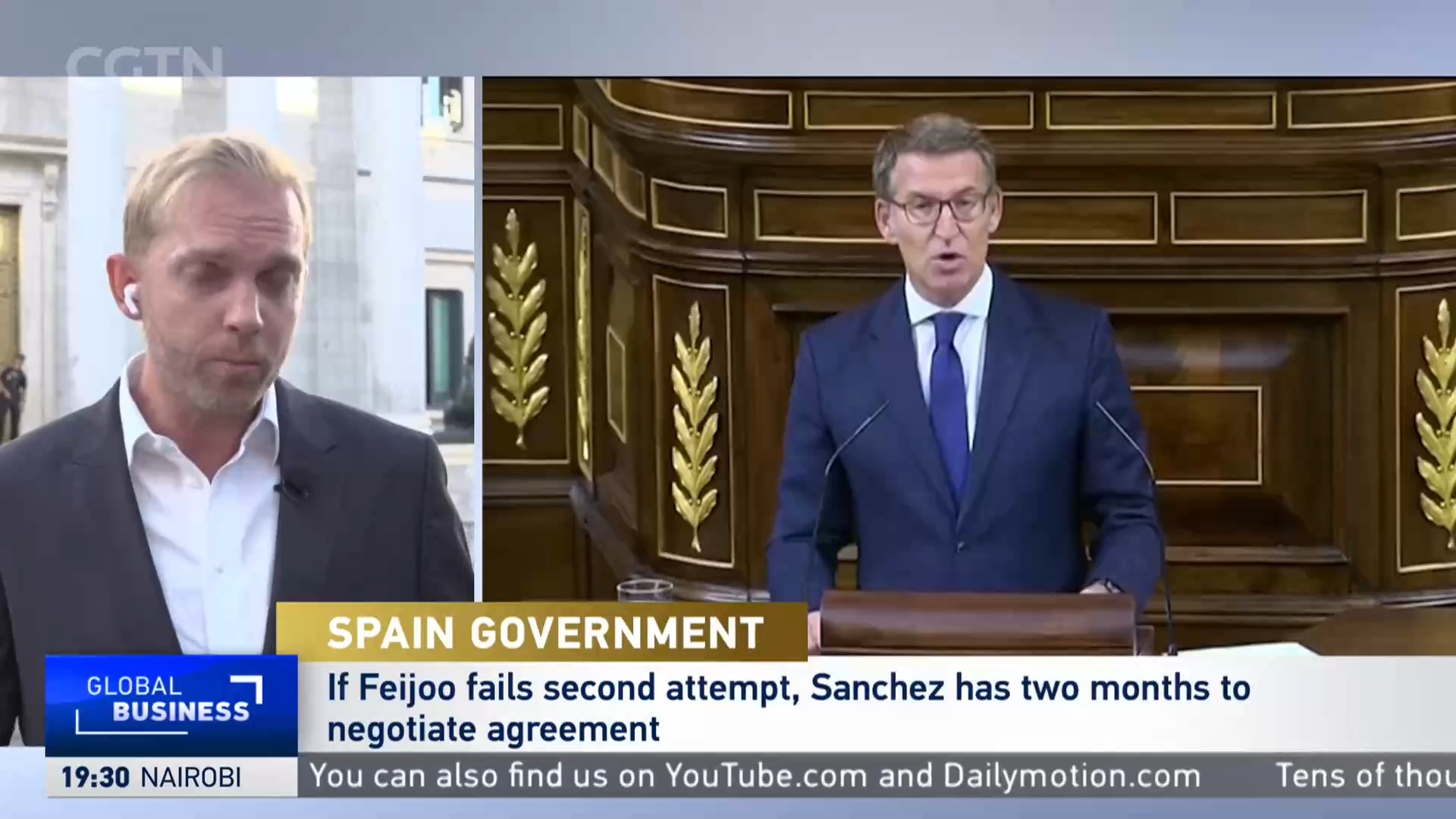03:08

It's 66 days since the general elections in July and yet Spain still doesn't have a government. On Wednesday (September 27) Alberto Nunez Feijoo, leader of the center-right People's Party (PP) tried to break the deadlock and become Spain's new Prime Minister, but failed.
Feijoo's would-be-coalition is four seats shy of 176 - the number required for a majority in the Spanish Congress - losing the investiture vote 178-172.

Feijoo leaves parliament after he didn't get enough votes to become Spanish prime minister. /Susana Vera/Reuters
Feijoo leaves parliament after he didn't get enough votes to become Spanish prime minister. /Susana Vera/Reuters
Why doesn't Spain have a government?
Feijoo and his People's Party won the most votes in July's elections, giving them the right to take their case to King Felipe VI and then to Congress to see if they could form a government. Spain's constitution states that the party that wins the most votes gets the first shot at forming a government, but the answer to that attempt was a resounding no.
READ MORE
60 million watched Zhang Zhilei fight
Türkiye raises interest rates to 30%
Why has the UK frozen interest rates?
The PP's problem is that they hitched their wagon to the rise of the far-right VOX party, feeling almost certain that a PP-VOX alliance would win enough seats for a four-year mandate, following the two parties' strong showing in local and regional elections in April. But VOX disappointed, dropping from 52 to 33 seats.
This meant that their right-wing coalition fell short of the seats needed to govern, but also meant it was impossible to win support from the Basque and Catalan parties, as VOX has pointedly antagonized the independence parties on the campaign trail, to the point of saying they would work to make the separatist parties illegal.

Sanchez leave parliament after People's Party leader Feijoo lost his investiture vote. /Susana Vera/Reuters
Sanchez leave parliament after People's Party leader Feijoo lost his investiture vote. /Susana Vera/Reuters
What happens next?
Feijoo won't be surprised at Wednesday's defeat. He knew, as did absolutely everyone else, that the writing was on the wall. Spain must now wait until Friday when there will be another vote to see if Feijoo can win a simple majority, the second step in the investiture process.
That's also likely to fail, with all parties almost certainly voting the same, meaning the PP and Feijoo will fall short again.
Why did Feijoo attempt to form a government if he knew it would fail?
That's the obvious question and the answer is to solidify his own personal position as leader of the conservative party, and also leader of the opposition. During the week one prominent radio talk show host compared Feijoo to Fredo, the older brother in the Godfather Trilogy who was overlooked and largely ignored as a serious contender to power.
Acting Prime Minister Pedro Sanchez might have been listening too as he had a little dig at Feijoo when he didn't even dignify the conservative leader's attempt to form a government with a response in parliament, surprising everyone by sending Oscar Puente, the mayor of Valladolid, to speak instead. PP deputies shouted "'coward" at Sanchez, which he laughed off.
Who will be Spain's next Prime Minister?
This was a chance for Feijoo to present his vision for a government and take center stage. He spoke for over an hour and a half about how terrible everything is in Spain under Sanchez and how wonderful it would be under his stewardship.
But the right's failure has left the door open to Sanchez and a very broad coalition on the left. The kingmakers are the Basque party BILDU and Catalan separatist party JUNTS, along with its leader Carles Puigdemont who has been in exile since the illegal independence referendum in 2017.
The price of JUNTS' support to form a government is an amnesty deal for Puigdemont and other Catalan leaders. That has inflamed the right which accuses Sanchez of negotiating with fugitives and traitors. On Sunday CGTN reported live from a protest in the center of Madrid against this possible amnesty deal where an estimated 40,000 people showed up.
When will Spain have a new government?
After Friday's final vote on Feijoo's bid to become premier, Sanchez will have two months to present his project for government to the King and then it'll be back to Congress for another vote. Right now Sanchez and his left-leaning coalition is negotiating with Puigdemont and JUNTS and most commentators see them getting closer to a deal.
JUNTS' support would put Sanchez and the left over the 176-seat threshold, making forming a government possible. However, if Sanchez sees the price of Puigdemont's support as too high, e.g. the possible insistence of a legal Catalan independence referendum, then neither side would be able to form a government and the country would go back to the polls early next year for their sixth general election in nine years.
While Sunday's protest against the amnesty was going ahead in Madrid, Sanchez was on government business in Barcelona. When asked about it he replied: "They're protesting against a socialist government, but I'm sorry, there's going to be one."

Subscribe to Storyboard: A weekly newsletter bringing you the best of CGTN every Friday